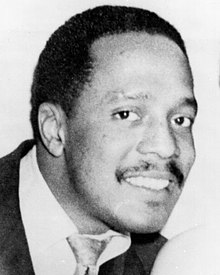Bud Powell
American jazz pianist and composer
Earl Rudolph "Bud" Powell (27 September 1924 – 31 July 1966) was an American Jazz pianist, usually considered one of the most influential in the history of the music.

| This musician-related article is a stub. You can help out with Wikiquote by expanding it! |
Quotes about Powell
edit- He was the foundation out of which stemmed the whole edifice of modern jazz piano; every jazz pianist since Bud either came through him or is deliberately attempting to get away from playing like him.
- Herbie Hancock, in DownBeat magazine (22 September 1966).